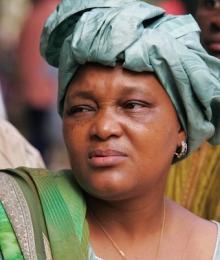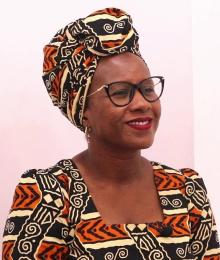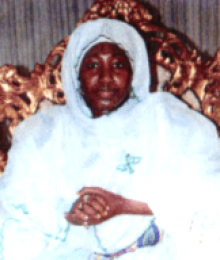
Rabiatou Serah Diallo was an emblematic figure of the Guinean social movement and a pioneer in the struggle for workers' rights. Born in 1949 in a modest family in Mamou, Fouta Djallon region, she transcended obstacles related to her gender and her origins to become the first African woman to lead a national union. With unwavering determination and courage, she climbed the ladder of unionism, becoming the head of the National Confederation of Guinean Workers (CNTG) in 2000. Under her visionary leadership, the CNTG has become one of the leading spearheads of the historic social movements of 2006 and 2007 in Guinea.
Symbol of resistance and voice of social justice, Rabiatou Serah Diallo marked her time by organizing the country's first general strike and leading a major trade union uprising against corruption. Her unwavering commitment led her to the presidency of the National Transitional Council in 2010, playing a key role in Guinea's democratic transition. Until her last breath on 28 June 2023, this exceptional woman embodied the struggle for workers' rights and the improvement of people's living conditions, leaving a lasting legacy in her country's social and political history.
Introduction
Rabiatou Serah Diallo, an exceptional woman whose name will forever be inscribed in the history of Guinea. Born on December 31, 1949 in Mamou, in the Peule region of Fouta Djallon, she began her life in a modest rural family. Little could have predicted then that this girl from a disadvantaged environment would become one of the most prominent figures in the Guinean social movement and the first African woman to lead a national union.
From an early age, Rabiatou Serah Diallo showed an unusual spirit of rebelliousness and determination. Rebelled against injustice and refusing to bow to conventions, she cultivated an internal force that prompted her to challenge established standards and to pave a path to emancipation.
Her exceptional journey, filled with challenges and victories, testifies to her resilience and unwavering courage. Despite the obstacles on her way, she never gave up her convictions, guided by a passion for social justice and the defense of workers' rights.
Education
Although born in a modest environment, Rabiatou Serah Diallo quickly understood the importance of education as a tool of emancipation. Driven by an insatiable thirst for knowledge, she began her studies in Conakry, where she graduated as Administrative Secretary in 1966.
However, her appetite for learning did not stop there. Aware of the challenges faced by women in the workplace, she continued her training to become a judicial secretary. This determination to push boundaries and acquire new skills enabled her to join the Corps of Magistrates in 1984, a remarkable achievement for a woman at the time.
Her academic career demonstrates her unwavering desire to rise beyond social expectations and to break down barriers imposed on women. Each step was a victory over prejudice and an affirmation of her ability to forge a promising future.
Professional career
Before entering into trade unionism, Rabiatou Serah Diallo held various positions that enabled her to develop her skills and prepare for her future mission. Her first job as Administrative Secretary at the Presidency of the Republic provided her with valuable experience in the world of work and an in-depth understanding of the ropes of administration.
Her rigour, dedication and a keen sense of organization quickly distinguished her from her peers, opening the doors to a promising career. However, despite the attractive prospects offered to her, Rabiatou Serah Diallo felt a more powerful internal appeal: to fight for workers' rights and to give a voice to the voiceless.
Union struggle
It was in 1985 that Rabiatou Serah Diallo took the decisive step towards trade unionism by being elected to the executive office of the National Confederation of Workers of Guinea (CNTG). Although she was appointed head of the women's department, a role traditionally attributed to women in the trade union movement, she quickly demonstrated her ability to transcend expectations and impose herself as a force for change.
Her unwavering commitment and unfailing determination enabled her to climb the ladder of the CNTG, breaking the barriers one by one. In 2000, she reached a historic peak by becoming the first African woman to take over the leadership of a national trade union as the general secretary of the CNTG.
Under her visionary leadership, the CNTG has become the country’s leading workers’ movement, with 60,000 affiliates. Rabiatou Serah Diallo has addressed two major challenges: to introduce trade unionism into a largely informal economy and to pave the way for women in an area traditionally dominated by men.
Her determination and leadership have inspired thousands of workers, transcending gender boundaries and uniting the nation’s vital forces around a common ideal of social justice and better living conditions.
General strike of 2006 and 2007
The year 2006 will mark a turning point in the history of the Guinean social movement, and Rabiatou Serah Diallo will be at the heart of this transformation. Faced with the alarming deterioration of the living conditions of the population, it managed to mobilize the masses and orchestrate the first general strike that the country had ever experienced.
This massive mobilization, supported even by the informal sector, which opened its markets only at night to enable the population to procure, was a remarkable success. It demonstrated the strength of the trade union movement and the determination of workers to be heard.
However, the battle of Rabiatou Serah Diallo was far from over. In 2007, she led a new worker union uprising, demanding, among other things, the expulsion of corrupt personalities from the government. This time, the repression was brutal, and Rabiatou Serah Diallo, along with other worker union leaders, were arrested on 22 January.
Despite international pressure, her unwavering determination prompted her to continue her fight, becoming a symbol of resistance for the Guineans. In a statement that became legendary, she responded to the accusations of wanting to "set fire" to the country by saying: "I am a wife and mother of six children, and when I set fire, it is under the cooking pot, to feed my children. But in Guinea, the cooking pot is empty. That's what puts the country on fire."
These words sounded like a shout of solidarity for all those aspiring to a better future, where dignity and justice would be guaranteed for all.
President of the National Transitional Council (CNT)
The sacrifice and tenacity of Rabiatou Serah Diallo ended up bearing fruit when, on 8 February 2010, she was appointed President of the National Transitional Council (CNT). This crucial body was responsible for managing the transition to a democratic regime in the absence of legislative power, with the National Assembly being dissolved by Moussa Dadis Camara.
In this role of the highest importance, Rabiatou Serah Diallo has once again demonstrated her outstanding leadership and her ability to bring together the vital forces of the nation. Under her clever leadership, the CNT successfully held the first round of the presidential election on 27 June 2010, marking a crucial milestone in the country's democratization process. Her determination and commitment to the cause of democracy have been praised both nationally and internationally.
Death
Unfortunately, the fate caught this exceptional woman on June 28, 2023, when she died at the Hospital of Sino-Guinean Friendship in Conakry at the age of 73, as a result of illness. Her disappearance was welcomed with immense sadness by the African worker union movement, which has lost a major figure and a powerful voice for workers' rights.
The journey of Rabiatou Serah Diallo has inspired generations of human rights activists and defenders, and its legacy continues through the lasting changes it has brought to Guinean society.
Works about her
The lasting impact of Rabiatou Serah Diallo on the social movement in Guinea and Africa has been immortalized in several biographical and historical books. Among the most notable are "Hadja Rabiatou Sérah Diallo: Life and battles of a trade union army" (2019) by Mody Sory Diallo, Mamadou Hafiziou Barry and Mamadú Saliou Diallo.
This book provides a detailed overview of her life, struggles and victories, tracing her flashing ascension from the modest rural environment to the highest spheres of power. It highlights her decisive role in the social movements of 2006 and 2007, as well as her historic appointment as head of the National Transitional Council.
Another remarkable book, "The Unspoken and the Unspoke: HADJA RABIATOU SERAH DIALLO BREAK SILENCE: TESTIMONY" (2022), co-written with Mamadou Aliou Diallo, offers a unique light behind the scenes of her opposition to Alpha Condé's third term in 2020. Rabiatou Serah Diallo presented her version of the events, revealing the discrimination and difficulties she and her son faced due to their political positions.
These books are valuable resources for historians, researchers and anyone who wants to understand the extent of Rabiatou Serah Diallo's impact on Guinea's society and the African workers' movement.
Private life
Behind the emblematic public figure was a woman devoted to her family and relatives. Mother of six children, Rabiatou Serah Diallo brilliantly reconciled her professional and trade union responsibilities with her family life.
Her courage and determination inspired not only Guinean workers, but also women in the country, demonstrating that it was possible to break social barriers and impose herself in areas traditionally dominated by men.
Despite the challenges and obstacles on her journey, Rabiatou Serah Diallo has always found the strength to continue her struggle, drawing her energy from the love of her family and her unwavering conviction that change is possible.
Conclusion
Rabiatou Serah Diallo's life and legacy testify to the strength and resilience of an exceptional woman who dedicated her life to the struggle for social justice and workers' rights. Her inspiring journey will remain in memory as a symbol of courage, perseverance and unwavering commitment to the common good.
From her humble origins in the Fouta Djallon region to her brilliant rise as the first African woman to lead a national union, Rabiatou Serah Diallo has challenged conventions and broken barriers with unwavering determination.
Her decisive role in the 2006 and 2007 general strikes, as well as her historic appointment as head of the National Transitional Council, marked decisive turning points in Guinea's history, paving the way for an era of change and progress.
Today, her legacy continues through the lasting changes she has brought to Guinean society and the inspiration she continues to inspire future generations of human rights activists and defenders.
Rabiatou Serah Diallo has left an indelible mark on the Guinea and African worker union movement, and her name will forever remain associated with the struggle for the improvement of the living conditions of the most vulnerable populations. Her courage, determination and unwavering commitment to the social cause will continue to illuminate the way to a more just and equitable future for all.






















